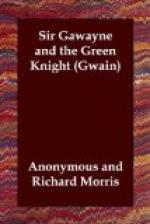65 Nowel nayted o-newe, neuened ful ofte.
Christmas celebrated
anew, mentioned full often.
Sir F. Madden
leaves the word nayted unexplained in his Glossary
to “Syr
Gawayne.”
124 syluener = sylueren, i.e. silver dishes.
139 lyndes = lendes, loins.
142 in his muckel, in his greatness.
184 Wat3 euesed al umbe-torne—? was trimmed,
all cut evenly around;
umbe-torne may
be an error for vmbe-corue = cut round.
216 in gracios werkes. Sir F. Madden reads
gracons for gracios, and
suggests Greek
as the meaning of it.
244-5 As al were slypped vpon slepe so slaked hor
lote3
in
hy3e.
As all were fallen
asleep so ceased their words
in
haste (suddenly).
Sir F. Madden
reads slaked horlote3, instead of slaked hor lote3,
which, according
to his glossary, signifies drunken vagabonds.
He evidently takes
horlote3 to be another (and a very uncommon) form
of harlote3 =
harlots. But harlot, or vagabond, would be a very
inappropriate
term to apply to the noble Knights of the Round Table.
Moreover, slaked
never, I think, means drunken. The general sense
of
the verb slake
is to let loose, lessen, cease. Cf. lines 411-2,
where sloke, another
form of slake, occurs with a similar meaning:
—
layt no fyrre;
bot
slokes.
—
seek no further,
but
stop (cease).
Sir F. Madden
suggests blows as the explanation of slokes. It
is, however, a
verb in the imperative mood.
286 Brayn. Maetzner suggests brayn-wod.
296 barlay = par loi. This word is exceedingly
common in the T. Book
(see l. 3391).
I
bid you now, barlay, with besines at all
Þat
ye set you most soverainly my suster to gete.—T.B.
l. 2780.
394 siker. Sir F. Madden reads swer.
440 bluk. Sir F. Madden suggests blunk (horse).
I am inclined to keep to
the reading of
the Ms., and explain bluk as = bulk = trunk.
Cf. the
use of the word
Blok in “Early English Alliterative Poems,”
p. 100, l. 272.
558 derue doel, etc. = great grief. Sir
F. Madden reads derne, i.e. secret,
instead of derue
(= derf). Cf. line 564.
577 knaged, fastened.
The
braunches were borly, sum of bright gold,
With
leuys full luffly, light of the same;
With
burions aboue bright to beholde;
And
fruit on yt fourmyt of fairest of shap,
Of
mony kynd that was knyt, knagged aboue.—T.B.
l. 4973.
629 & ay quere hit is endele3, etc.
And everywhere
it is endless, etc.
Sir F. Madden
reads emdele3, i.e. with equal sides.




